Surely I’m not the only one who has wasted my time Google searching something like “natural bug control.”
I don’t know about you, but what I usually found were long lists (mostly on sites with very little to back up their information) of just about anything that the writer thought might repel a bug or two. Harsh, maybe, but if I had a dollar for every questionable idea I tried…. Well, I guess it would pay for all the cinnamon, baby powder, garlic, corn meal, borax, etc. I have wasted!
Believe me, I love frugal and resourceful solutions to problems just about as much as anyone you’ll meet, but sometimes, you just need something you know will work. Keep reading for natural bug control products that are tried and true!
I will continue to update this page with products and methods I try or that have been used successfully by other gardeners I know well.
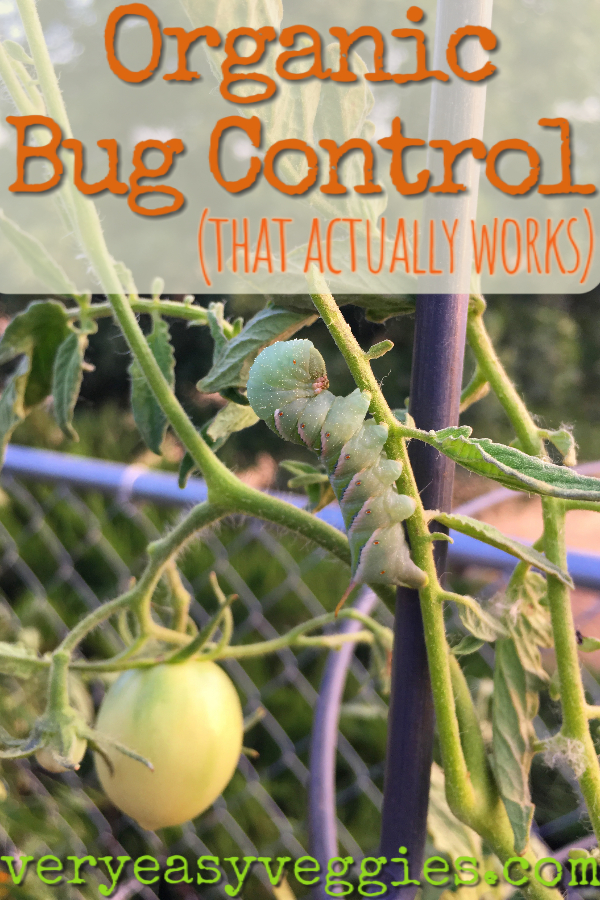
Not Effective
Let’s get these out of the way first since they aren’t really worth our time. Some may seem silly, but are all suggestions I’ve found (shockingly—or not—it turns out that not everything on the Internet is true!). Perhaps some of them will make bugs go around for a while instead of walking through it, but that’s not really my definition of effective bug control.
Not effective: Cinnamon, cayenne pepper (fun to sprinkle around though), baby powder, tea bags or cucumber slices (??), cornmeal, lemon juice or vinegar (which can burn or kill your plants).
Some effectiveness with only certain bugs: fresh herbs like mint, catnip, marigolds, etc. my mint plants still have bug holes chewed in the leaves.
I’ve also seen straight peppermint essential oil repel ants for a day or two, but it seems to me you’d need to use a lot for it to work as your only weapon against them.
I haven’t tried essential oils extensively for bug control but so far I place them in the “somewhat effective” category (sorry to those who swear by them!). I’m happy to give something a try if you have seen otherwise though. We don’t usually have mosquitos so I can’t personally attest to lemon eucalyptus oil although I’ve heard it works.
Effective
(with some caveats)
This portion contains affiliate links for your convenience–If you choose to make a purchase using one of these links, this website may receive a small percentage at no extra cost to you. I appreciate your support if you find this information helpful!
Honestly I think a lot of organic bug control tends to fall in this category—most organic or natural products are not going to pack the same instant punch that more chemically based products will. These products do work well for their purpose but some are only designed to kill certain types of insects.
For all, you must be sure to follow the label and spray very thoroughly, mix at the recommended dilution rate, and re-spray according to the label instructions if needed. Here are some options that work well.
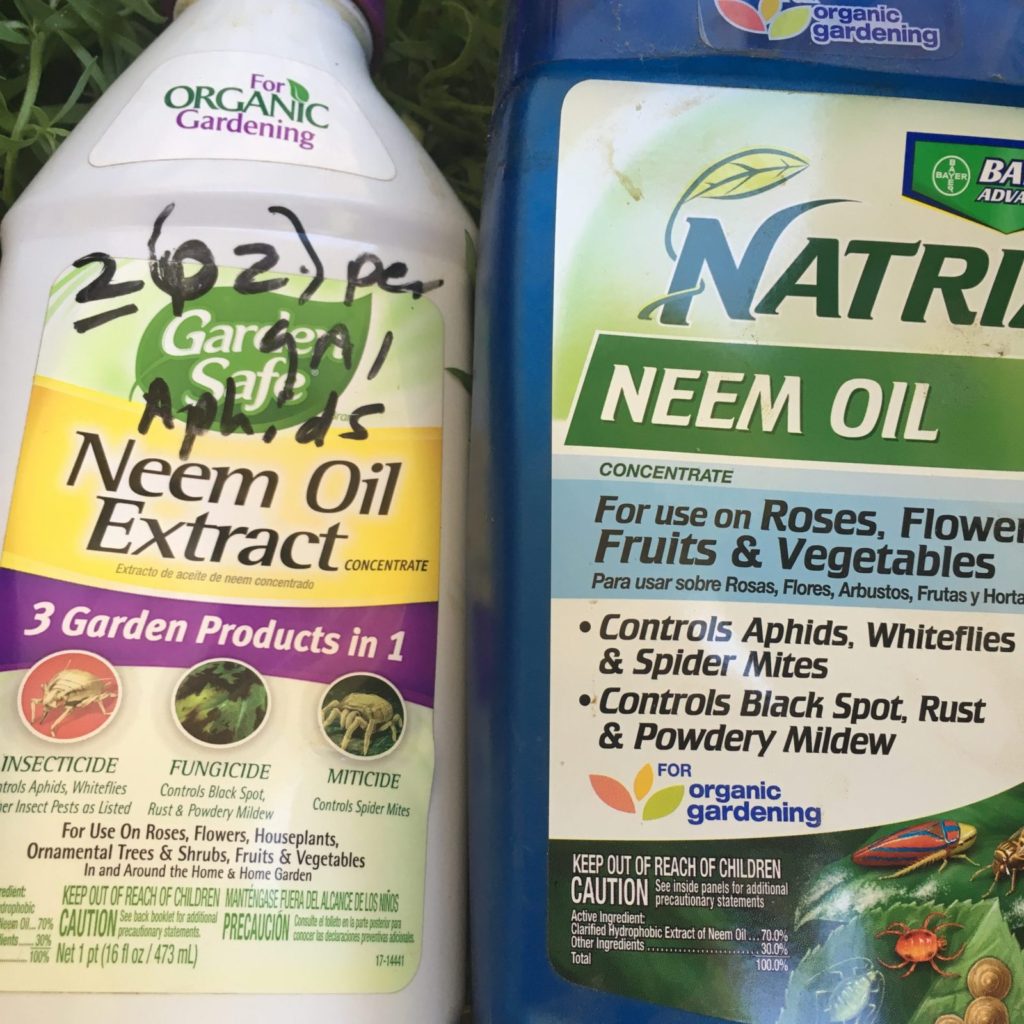
Neem Oil
Neem oil is one product I think every gardener should have in their toolkit, especially for organic gardening. It is actually a plant extract and is great as both a fungicide and an insecticide—for certain insects, like aphids, mites, and whiteflies (possibly even more).
Neem may not work for caterpillars or chewing insects–these are be better controlled by one of the products I mention further down in this post. All the same Neem is an organic lifesaver for several different insect and fungal problems. It is completely safe for bees and beneficial insects once dry.
You can find it at Home Depot here or on Amazon below. Some say the “Pure Bliss Neem oil” pictured below works the best because it is the purest. Make sure to follow the package instructions for correct dilution or to see if repeat spraying is needed.
Never heard of needing a fungicide for plants? If your plants have white, brown, or black spots, or the leaves are looking yellow or sickly for reasons you don’t think are related to watering or poor soil, they may benefit from a fungicide. In my area, roses are especially prone to a white fungus on the leaves known as powdery mildew. Neem works great for this. You may have to spray more than once if the problem is particularly bad, just check the label instructions.
Above are some affiliate links to a few good Neem products, either concentrate or ready-to-spray.
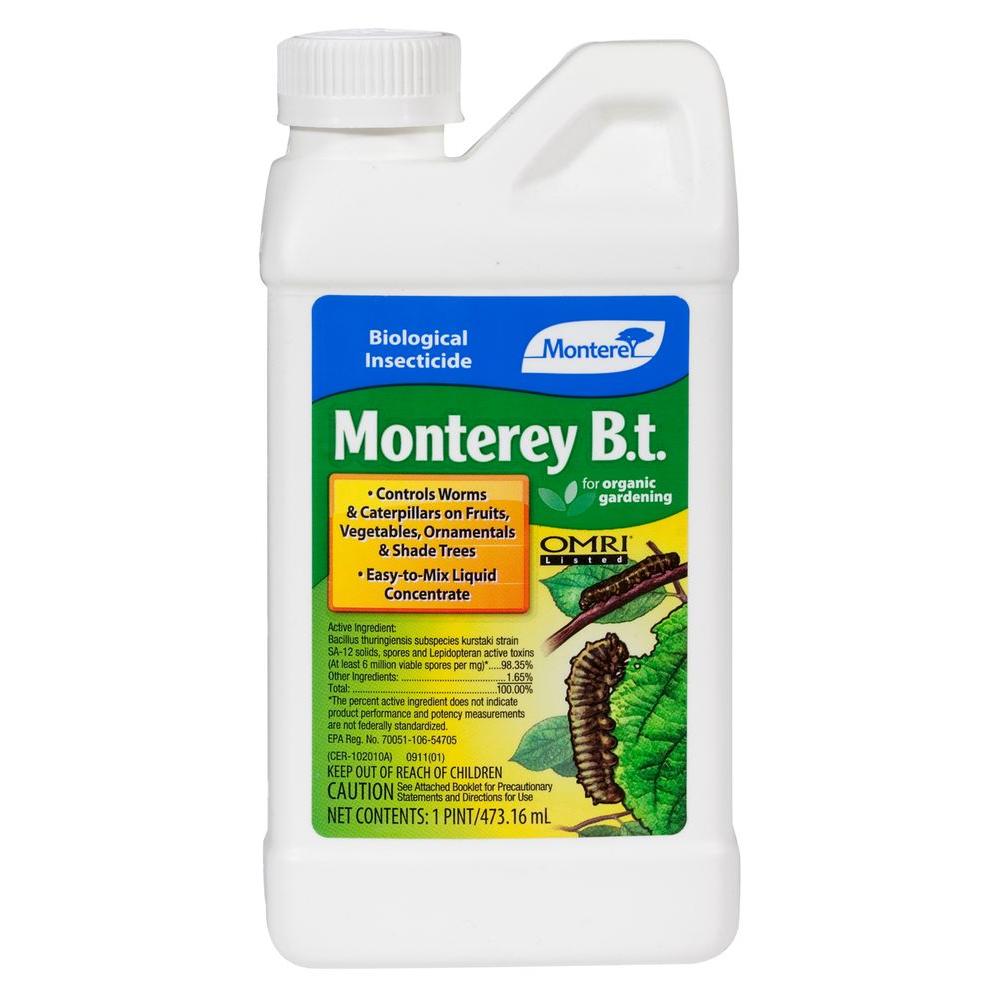
B.T. or Bacillus Thurigiensis
As you may have guessed from the name, this “biological insecticide” is made with bacteria that kills caterpillars from the inside when they eat it. Wait, after they eat it?? Yes. So, although it works, it may not appear to have the same instant effects as a chemical that kills as soon as insects touch or get near it.
All the same, it is a good prevention option specifically for “chewing insects.” It is generally harmless to people, pets, birds, bees, and ladybugs. You can look at a few options in the affiliate links below—note that some is concentrate and some is ready-to-spray. Be sure to follow label instructions.
(But is there an even better option for leaf eaters? Keep reading!
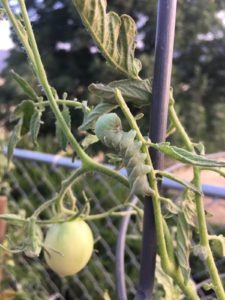
Spinosad
Spinosad is another exciting bacterial product similar to B.T. (many say it’s actually even better)! Apparently it is somewhat newer to the home-grower market and less well known, though it’s been used by professional organic farmers for some time.
Some spinosad products are currently out of stock on Amazon, some of the ones below are OMRI listed but I am unsure if the captain jack ones are.
Some perusing of the product description and reviews on Amazon will tell you that it works very well for beetles, caterpillars, leaf miners, thrips, vine borers, and even ants to some degree. It does NOT work as well on aphids (try Neem oil above for those). I have heard it even works for squash vine borers if sprayed inside the vine where they are working. If you’re wondering if it works on a certain insect, check the label or search the Amazon reviews by many satisfied customers!
Let me know what you think if you try it–I’ve heard nothing but great things! It’s hard to find in stores, but Home Depot also carries it online at the link below.
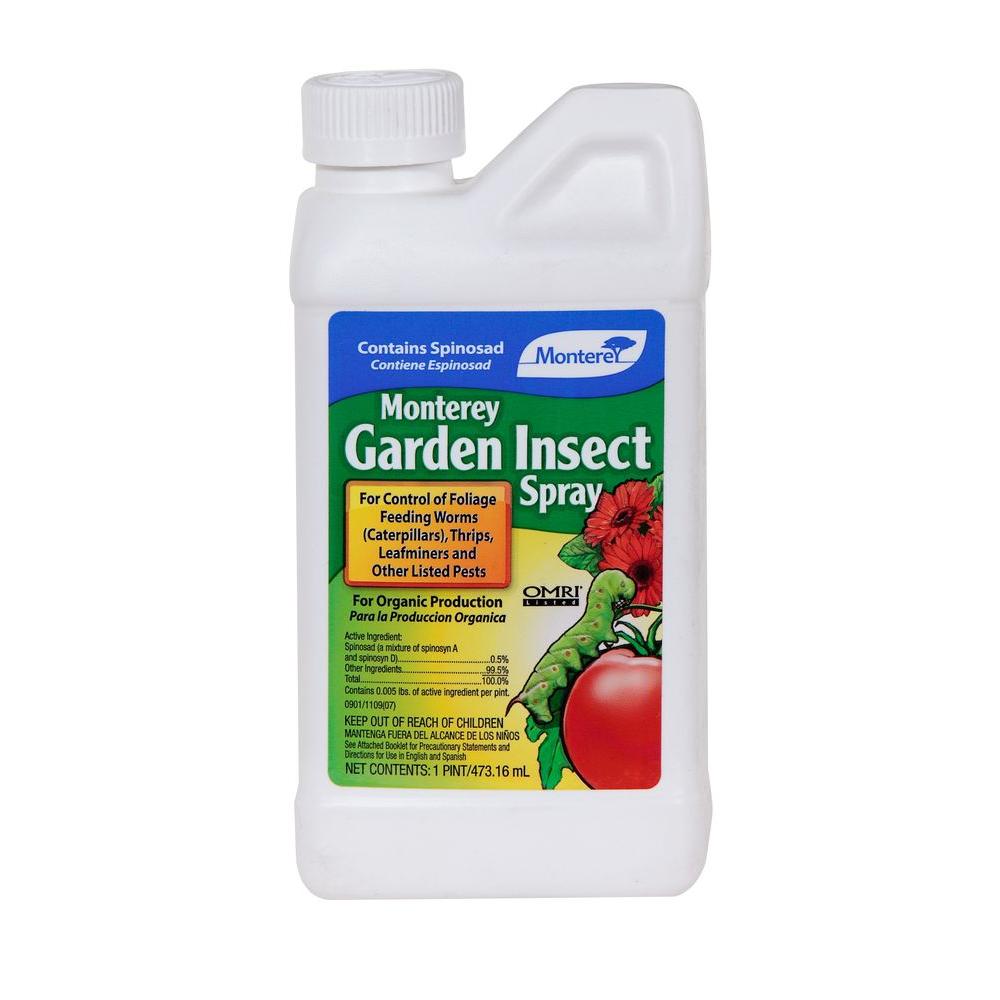
Learn something new yet? Subscribe by email for more!
Diatomaceous Earth
You may have already heard of this one—I’ve always thought it’s a fun term—since it is a common go-to for those who want a completely non-chemical and non-toxic insect killer. In fact, some say it can be ingested (intestinal parasites, anyone?) or used to keep insects out of food storage or off of pets. (You can research and make your own decision on all of that). Find it on Amazon below or at Home Depot here.
What I do know is that it is made of microscopic shards of a natural silica substance (from fossilized skeletons of tiny aquatic creatures) that are said to cut an insect’s outer shell and therefore kill it by dehydration. (Like it’s name, strange but rather memorable.)
Diatomaceous earth works best when dry and can be sprinkled on soil surface or plants themselves. Theoretically, insects must cross it or touch it to be affected; or they may choose to avoid it.
Personally, I have not tried it enough times to say for sure how quickly it works, but would love to hear from you if you have. I worry that many bugs are sneaky and determined enough to get around physical barriers, but if you’re able to apply it thoroughly, it should at least help with crawling insects. I hear it is usually safe for earthworms.
Organic Slug & Grub Control
Personally I haven’t had to deal with slugs or snails, but this post has some tips from someone who has. In addition to Sluggo plus bait (which actually contains Spinosad) she recommends copper scrubbers like these which can be unrolled or used as a barrier ring. Apparently the copper reacts with and shocks the slug. You can also find rolls of copper mesh which would work in a similar way (until they become tarnished).
Grubs are worm-like caterpillars that are typically found in the soil. Many of them may eat or damage roots. If you are dealing with grubs, try a milky spore product. chickens or beneficial nematodes may help.
Is this post helpful? Share to help others control pests organically!
Do you have a favorite product or tip that wasn’t listed? Let us know in the comments!
If you want to dive in and learn more about regenerative, organic, no-till vegetable gardening (including composting, succession planting, organic pest control tips, and winter gardening), check out this great video course by expert market gardeners in zone 7 Canada at Local Harvest.

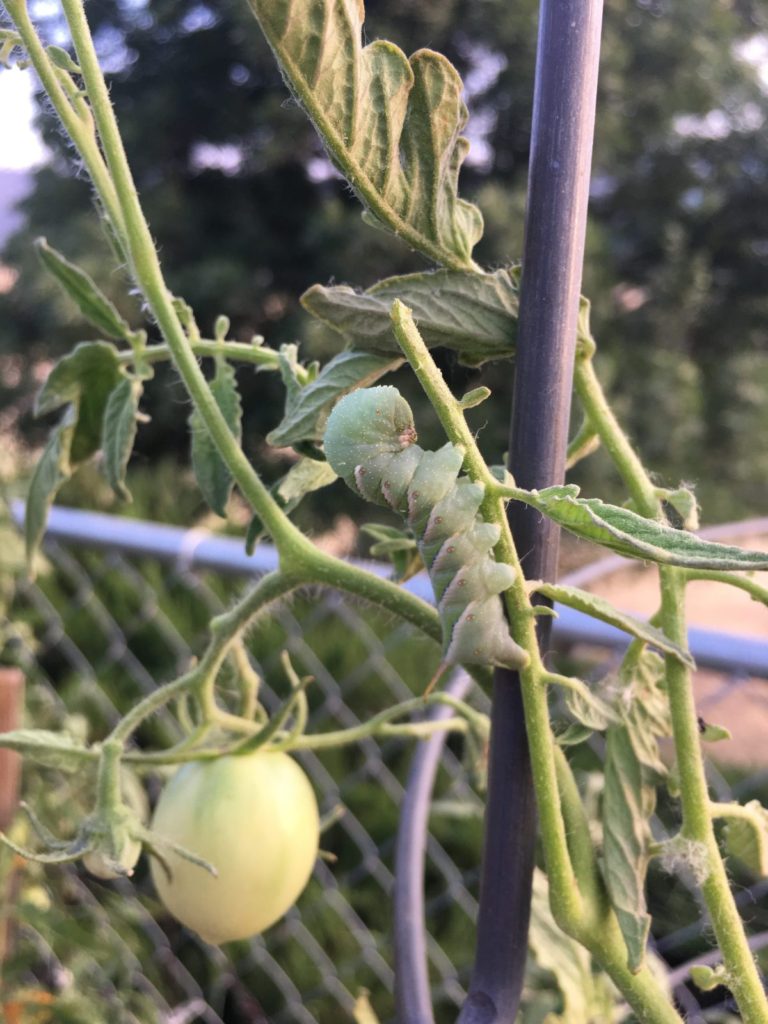
Ants will avoid baby powder more so over crossing borax. [Straight up borax will still kill them though] Cinnnamon will dispel them also. I have watched them leave areas outside they were congregating and not return.
I sprinkled borax or baby powder under mats outside and they left. They vacated areas they were hoarding around outside with cinnamon sprinkled on top of them. In house the use of baby powder was more effective to stop them from coming out from behind my dishwasher than borax. I used baby powder under eaves and in faschia and they began piling out, including the queen and have left those areas.
Where I sprayed with water/essential oil of peppermint they left but this was temporary as it was outside. But it was interesting to see this effect.
These tactics were used with odourous ants.